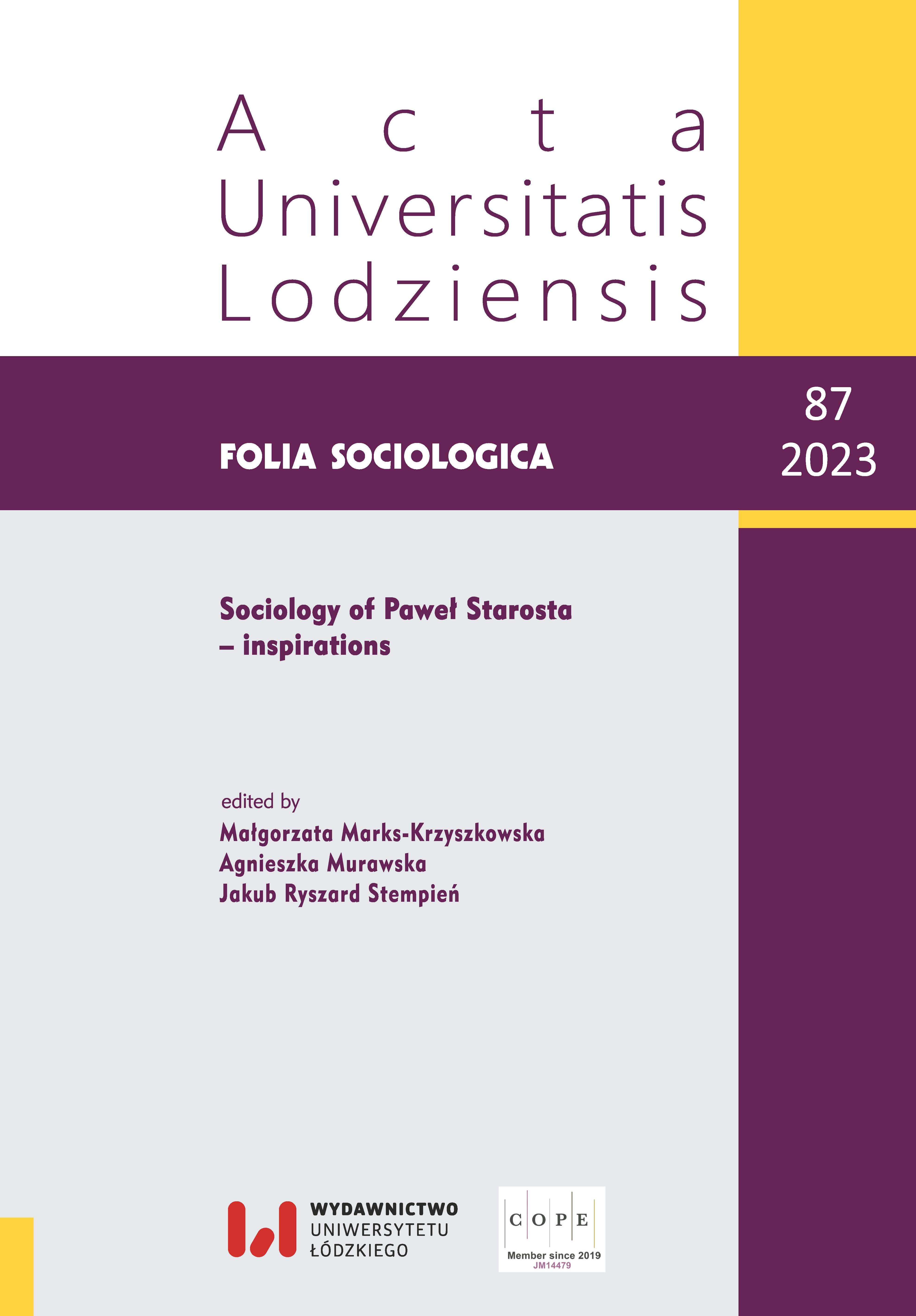Rustica Nova. The new countryside in Hungary at the turn of the millennium
DOI:
https://doi.org/10.18778/0208-600X.87.08Keywords:
depeasantization, land reform, community, traditions, hybridity, cultural re-definitionAbstract
This paper comprehensively presents the complex transformation of rural Hungary after the turn of the millennium. The post-socialist land re-privatization provided land to more than 2 million families, but by the time of EU accession (2004) a highly concentrated large estate structure had already developed. The number of the village population decreased somewhat, but its proportion remained high at around one-third, together with rural towns people 50% in Hungarian society. Despite the surviving and hybrid structures, depeasantization, the disappearance of the traditional peasantry, took place, as a result of tourism, the new type of town-village relations, the cultural reinterpretation of the countryside and its traditions began, but the social disadvantages are still more strongly concentrated in the villages than in the cities.
References
Ángyán J. (2012), Föld- és birtokpolitika alulnézetből, Megyei esettanulmányok.
Google Scholar
Ángyán J. (2014), Mi lesz veled magyar föld, mezőgazdaság, vidék?, [in:] B. Andrásfalvy, J. Ángyán, G. Márai, G. Molnár, E. Tanka (eds.), A magyar föld sorsa, Agroinform Kiadó, Budapest, pp. 101–108.
Google Scholar
Az állami földbérleti rendszer értékeléséhez. IV. jelentés a földről. Gödöllő, http://www.kielegyenafold.hu/userfiles/file/IV_jelentes_a_foldrol_20121215_NG_2013042 2.pdf
Google Scholar
Borsos E., Csite A., Hella F. (1999), Rendszerváltás utáni falusi sorsforduló Ököritófülpösön, “Szociológiai Szemle”, pp. 95–119.
Google Scholar
Csite A., Kovách I., (1995), Posztszocialista átalakulás Kelet- és Közép Európa rurális társadalmaiban, “Szociológiai Szemle”, vol. 2.
Google Scholar
Csite A., Kovách I., (2002), Vidéki történet, [in:] I. Kovách (ed.), Hatalom és társadalmi változás. A posztszocializmus vége, Napvilág Kiadó, Budapest, pp. 219–309.
Google Scholar
Csurgó B. (2007), Képek és képzetek a mai magyar vidékről, [in:] I. Kovách (ed.), Vidékiek és városiak, L’Harmattan – MTA PTI, Budapest, pp. 45–67.
Google Scholar
Csurgó B. (2013), Vidéken lakni és vidéken élni, Argumentum, Budapest.
Google Scholar
Glózer R. (2007), Falusi politikák. Közösségtanulmány. Módszertani jegyzet, Néprajzi Múzeum – PTE-BTK Kommunikáció-és Médiatudományi Tanszék, Budapest, pp. 147–160.
Google Scholar
Granberg L., Kovách I., Tovey H. (eds.), (2001), Europe’s Green Ring, Ashgate, Aldershot–Burlington–Singapore–Sydney.
Google Scholar
High C., Nemes G. (2007), Social Learning in LEADER: Exogenous, Endogenous and Hybrid Evaluation in Rural Development, “Sociologia Ruralis”, no. 47(2), pp. 103–119. https://doi.org/10.1111/j.1467-9523.2007.00430.x
Google Scholar
DOI: https://doi.org/10.1111/j.1467-9523.2007.00430.x
Kelemen E., Megyesi B. (2007), The Role of Collective Marketing Initiatives in the Hungarian Agriculture, “Eastern European Countryside”, no. 13(1).
Google Scholar
Kotics J. (2007), Magyar közösségkutatás története a 20. században, [in:] É. Kovács (ed.), Közösségtanulmány. Módszertani jegyzet, Néprajzi Múzeum – PTE-BTK kommuniáció- és Médiatudomány Tanszék, pp. 23–43.
Google Scholar
Kovách I. (1994a), The Privatization and the Future of Family Farms in East-Central Europe, “Sociologia Ruralis”, vol. 34(4), pp. 369–382. https://doi.org/10.1111/j.1467-9523.1994.tb00819.x
Google Scholar
DOI: https://doi.org/10.1111/j.1467-9523.1994.tb00819.x
Kovách I. (2001), De-peasantisation of Hungarian Rurality, [in:] L. Granberg, I. Kovách, H. Tovey (eds.), Europe’s Green Ring, Taylor & Francis, pp. 66–89. https://doi.org/10.4324/9781315255811-2
Google Scholar
DOI: https://doi.org/10.4324/9781315255811-2
Kovách I. (2007), A múlt és jelen vidékképe. Bevezetés, [in:] I. Kovách (ed.) Vidék- és falukép a változó időben, Argumentum, Budapest, pp. 7–11.
Google Scholar
Kovács D. (2003a), Falusi vendéglátás Magyarországon, Agroinform Kiadó, Budapest.
Google Scholar
Kovács D. (2003b), A falusi turizmus hagyományai, Mezőgazda Kiadó, Budapest.
Google Scholar
Kovács É. (ed.), (2007), Közösségtanulmány. Módszertani jegyzet, Néprajzi Múzeum – PTE-BTK kommuniáció- és Médiatudomány.
Google Scholar
Lányi A. (2009), Porcelán az elefántboltban. Az ökológiai politika kezdetei Magyarországon, Heti Válasz Kiadó, Budapest.
Google Scholar
Pataki Gy., Bodorkós B., Balázs B., Bela Gy., Kelemen E., Kohlheb N. (2011), A vidékfejlesztés demokratizálásának lehetősége: részvételi akciókutatás a Mezőcsáti Kistérségben, [in:] Gy. Pataki, A. Vári (eds.), Részvétel – akció – kutatás: magyarországi tapasztalatok a részvételi-, akció- és kooperatív kutatásokból, MTA Szociológiai Kutatóintézet, Budapest, 28–51.
Google Scholar
Starosta P. (1998), Inhabitants’ Feeling of Social Bonds with Rural and Small Town Communities in Bulgaria, Poland and Russia, [in:] L. Grandberg, I. Kovách (eds.), Actors on Changing European Countryside, Institute for Political Sciences, Budapest, pp. 104–131.
Google Scholar
Starosta P., Draganova M. (1999), Social Identification with Local Communities and the Globalization Process in Rural areas of Eastern Europe, [in:] Ch. Kasimis, A. Papadopoulos (eds.), Local Responses to Global Integration, Ashgate, Aldershot, pp. 133–152. https://doi.org/10.4324/9780429445736-7
Google Scholar
DOI: https://doi.org/10.4324/9780429445736-7
Tímár J. (2007), Társadalmi nemek, aprófalu- és közösségtanulmányok, [in:] É. Kovács (ed.), Közösségtanulmány. Módszertani jegyzet, Néprajzi Múzeum – PTE-BTK Kommunikáció- és Médiatudományi Tanszék, Budapest–Pécs, pp. 115–133.
Google Scholar
Downloads
Published
Versions
- 2023-11-30 (2)
- 2023-11-30 (1)
How to Cite
Issue
Section
License

This work is licensed under a Creative Commons Attribution-NonCommercial-NoDerivatives 4.0 International License.










